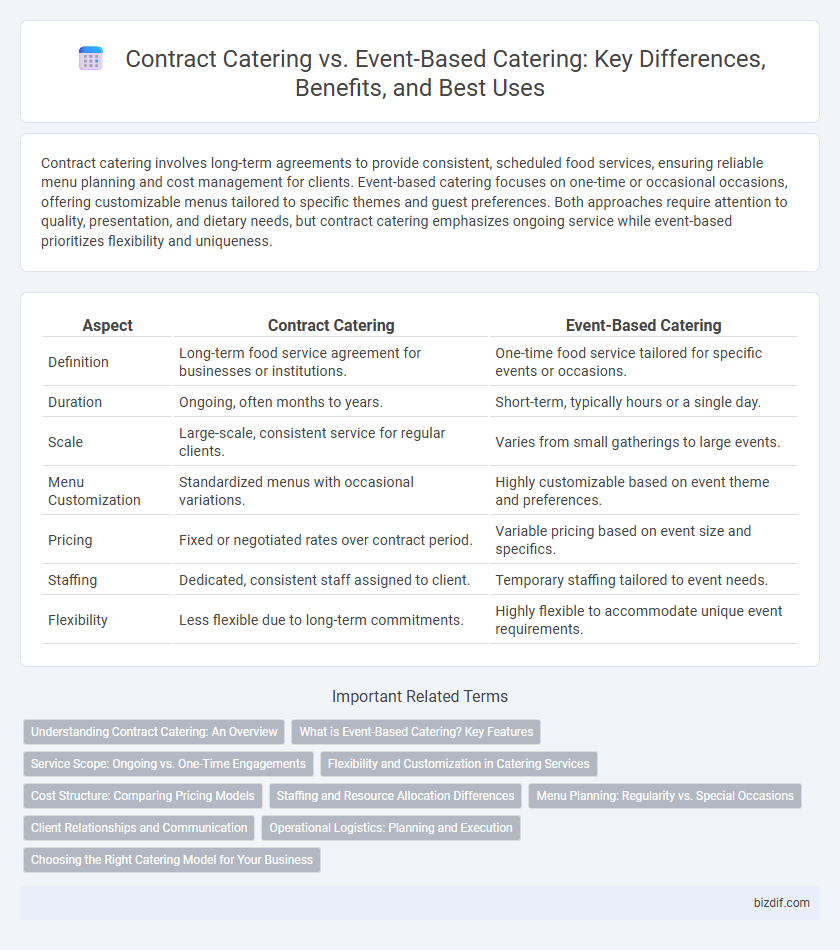Contract catering involves long-term agreements to provide consistent, scheduled food services, ensuring reliable menu planning and cost management for clients. Event-based catering focuses on one-time or occasional occasions, offering customizable menus tailored to specific themes and guest preferences. Both approaches require attention to quality, presentation, and dietary needs, but contract catering emphasizes ongoing service while event-based prioritizes flexibility and uniqueness.
Table of Comparison
| Aspect | Contract Catering | Event-Based Catering |
|---|---|---|
| Definition | Long-term food service agreement for businesses or institutions. | One-time food service tailored for specific events or occasions. |
| Duration | Ongoing, often months to years. | Short-term, typically hours or a single day. |
| Scale | Large-scale, consistent service for regular clients. | Varies from small gatherings to large events. |
| Menu Customization | Standardized menus with occasional variations. | Highly customizable based on event theme and preferences. |
| Pricing | Fixed or negotiated rates over contract period. | Variable pricing based on event size and specifics. |
| Staffing | Dedicated, consistent staff assigned to client. | Temporary staffing tailored to event needs. |
| Flexibility | Less flexible due to long-term commitments. | Highly flexible to accommodate unique event requirements. |
Understanding Contract Catering: An Overview
Contract catering involves providing ongoing food services under a formal agreement, typically for institutions, businesses, or educational facilities, ensuring regular and consistent meal delivery. This type of catering requires long-term planning, menu management, and adherence to specific dietary and operational guidelines tailored to the client's needs. Understanding contract catering is crucial for optimizing resource allocation, maintaining quality control, and delivering a seamless dining experience over extended periods.
What is Event-Based Catering? Key Features
Event-based catering specializes in providing food and beverage services tailored to specific occasions such as weddings, corporate events, or festivals, emphasizing customization and flexibility. Key features include menu personalization, on-site meal preparation, thematic presentation, and a focus on creating a unique culinary experience aligned with the event's purpose. This catering type often requires coordination with event organizers to ensure seamless service matching the event schedule and guest expectations.
Service Scope: Ongoing vs. One-Time Engagements
Contract catering involves long-term service agreements providing consistent meal planning, regular deliveries, and staff management for corporations, schools, or healthcare facilities, ensuring seamless daily operations. Event-based catering offers tailored services focused on a single occasion such as weddings, corporate events, or parties, with customized menus, setup, and teardown all within a limited timeframe. The service scope differs significantly as contract catering supports ongoing engagements while event-based catering addresses one-time, specialized needs.
Flexibility and Customization in Catering Services
Contract catering offers consistent, long-term food service solutions tailored to the specific needs of institutions or businesses, providing stable menu options with limited flexibility. Event-based catering prioritizes customization, allowing clients to select unique menus, themes, and service styles to suit one-time occasions or special events. Flexibility in event-based catering enables rapid adjustments to guest preferences and dietary requirements, contrasting with the structured nature of contract catering agreements.
Cost Structure: Comparing Pricing Models
Contract catering typically involves fixed pricing models based on long-term agreements, which provide predictable costs and volume discounts for recurring services. Event-based catering usually adopts variable pricing, influenced by factors such as event size, menu complexity, and duration, leading to potentially higher per-unit costs but greater customization. Understanding these pricing dynamics enables clients to select the most cost-effective option aligned with their budget and service requirements.
Staffing and Resource Allocation Differences
Contract catering involves long-term agreements with fixed staffing levels to support consistent daily operations, optimizing resource allocation through predictable demand patterns. Event-based catering requires flexible staffing that scales rapidly based on event size and intensity, necessitating dynamic resource allocation to manage peak workloads effectively. Efficient management in both models hinges on balancing labor costs with service quality to ensure customer satisfaction.
Menu Planning: Regularity vs. Special Occasions
Contract catering involves consistent menu planning tailored to regular daily or weekly services, ensuring dietary requirements and preferences are systematically met. Event-based catering demands customized menus designed specifically for unique occasions, emphasizing theme alignment, variety, and special dietary accommodations. Menu planning in contract catering prioritizes efficiency and consistency, while event-based catering focuses on innovation and guest experience for one-time events.
Client Relationships and Communication
Contract catering involves long-term partnerships where consistent communication and understanding of client preferences are essential for tailored service delivery. Event-based catering requires rapid, precise communication to meet specific, often one-time client expectations, emphasizing flexibility and responsiveness. Building strong client relationships in contract catering fosters trust and reliability, while event-based catering prioritizes clear, detailed coordination to achieve event success.
Operational Logistics: Planning and Execution
Contract catering involves long-term agreements for ongoing food service, requiring comprehensive planning, inventory management, and staff scheduling to ensure consistent delivery across multiple days or weeks. Event-based catering demands flexible logistics tailored to one-time or occasional events, prioritizing rapid setup, customized menu preparation, and efficient teardown to accommodate varying guest numbers and venues. Both require meticulous coordination of supply chains, kitchen operations, and service personnel to meet client expectations while optimizing resource allocation.
Choosing the Right Catering Model for Your Business
Contract catering offers a consistent, long-term food service solution tailored to specific business needs, ensuring streamlined operations and regular customer satisfaction. Event-based catering provides flexible, one-time services ideal for special occasions, allowing businesses to customize menus and scale services based on event size and type. Selecting the appropriate catering model depends on your business goals, frequency of events, and desired level of operational control.
Contract catering vs Event-based catering Infographic

 bizdif.com
bizdif.com